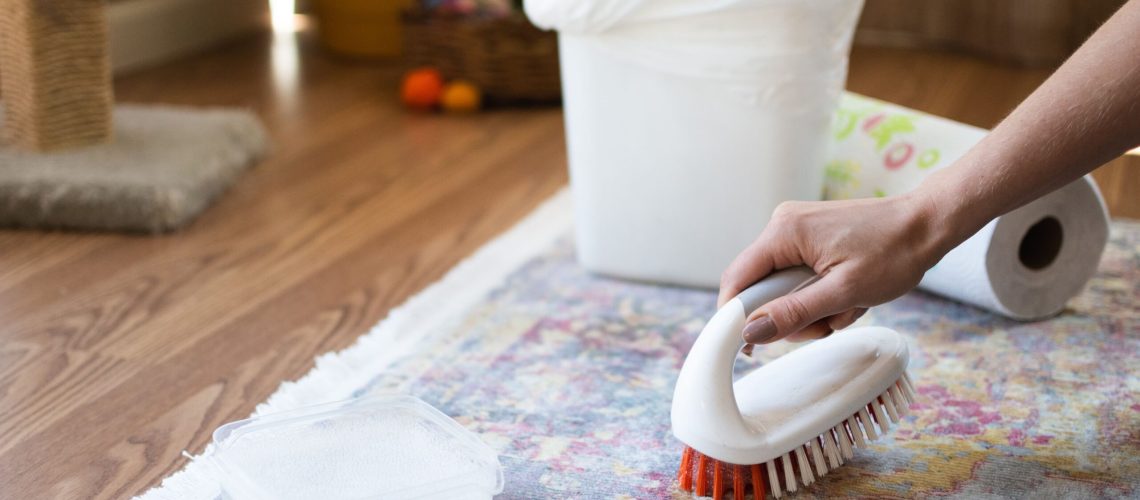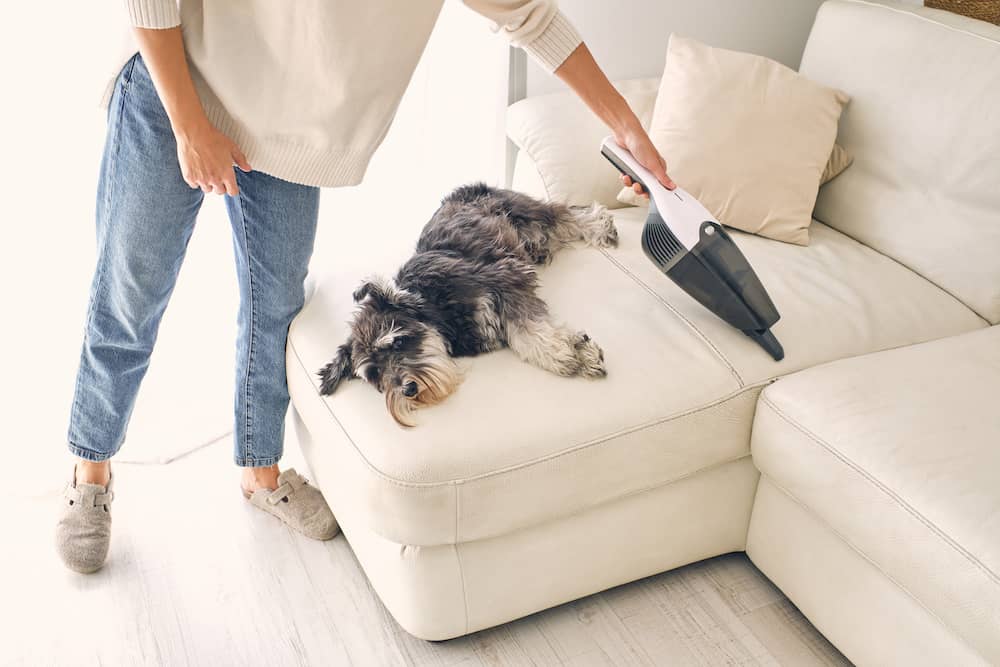Discover common cat messes and accidents in your home. Learn how to prevent them and safely clean up cat urine or feces from different surfaces.
Key Takeaways:
- Act quickly: It's important to clean up cat messes and accidents as soon as possible to prevent stains and odors from setting in.
- Use an enzymatic cleaner: Enzymatic cleaners are specifically designed to break down the proteins in cat urine, eliminating both the stain and odor.
- Avoid using ammonia-based cleaners: Ammonia can actually attract cats back to the same spot, so it's best to avoid using cleaning products that contain ammonia when dealing with cat messes.
- Blot, don't rub: When cleaning up a wet mess, such as urine or vomit, blotting the area with a clean cloth or paper towel is more effective than rubbing, which can spread the mess further.
- Consider using a black light: A black light can help you locate hidden urine stains that may not be visible to the naked eye, allowing you to thoroughly clean and eliminate them.
Common Cat Messes and Accidents in Your Home
Cats are curious creatures, and sometimes their curiosity can lead to messes and accidents in your home. They may knock over plants, spill water bowls, or scatter litter outside the litter box. It's not uncommon for cats to have occasional accidents outside their designated area. This could be due to stress, illness, or a dirty litter box.
To prevent common cat messes, make sure to secure any breakable items or plants that your cat might be tempted to explore. Keep water bowls on stable surfaces and consider using non-spill options. Regularly clean the litter box to encourage your cat to use it consistently.
Examples of Common Cat Messes:
- Knocked over objects
- Scattered litter
- Spilled water bowls
- Accidental urination or defecation outside the litter box
Tips for Prevention:
- Secure breakable items or plants out of your cat's reach
- Use non-spill water bowls or place them on stable surfaces
- Clean the litter box regularly to maintain cleanliness and hygiene
By being proactive and taking steps to prevent common cat messes, you can keep your home cleaner and more organized while ensuring a happier environment for both you and your feline friend.
Safely Cleaning Up Cat Urine or Feces from Different Surfaces
Cleaning up after your cat is an essential part of responsible pet ownership. When dealing with cat urine or feces, it's important to handle it safely and effectively without causing harm to yourself or your home. The method of cleaning may vary depending on the surface affected.
If your cat has urinated or defecated on a hard surface, such as tile or linoleum, start by wearing gloves and using paper towels to remove as much of the mess as possible. Then, clean the area with a mixture of water and mild detergent. Rinse thoroughly and dry the surface to prevent any lingering odor.
For carpets or upholstery, it's crucial to act quickly. Blot up any excess urine or feces with paper towels, being careful not to rub the stain deeper into the fabric. Use a specialized enzymatic cleaner designed for pet stains and follow the instructions carefully. These cleaners break down the organic compounds in cat urine or feces, eliminating both the stain and odor.
Safe Cleaning Tips:
- Wear gloves when handling cat waste
- Use paper towels to remove as much of the mess as possible
- Clean hard surfaces with a mixture of water and mild detergent
- Blot carpet or upholstery stains instead of rubbing them
- Use enzymatic cleaners for effective stain and odor removal
Remember, always follow safety precautions when cleaning up after your cat, and use appropriate products that are safe for both you and your furry companion.
The Importance of Promptly Cleaning Up Cat Messes
Cleaning up after your cat may seem like a chore, but it's essential to do so promptly for several reasons. First and foremost, prompt cleanup helps maintain a clean and hygienic living environment for both you and your cat.
If left uncleaned, cat urine can seep into porous surfaces like carpets, leaving behind a strong and unpleasant odor. This can be difficult to remove once it has set in. Additionally, urine or feces left on surfaces can attract bacteria and pests, posing health risks for both humans and cats.
Another crucial reason to clean up cat messes promptly is to prevent your cat from developing inappropriate elimination habits. Cats are creatures of habit, and if they repeatedly encounter their own waste outside the litter box, they may start associating that area with a suitable place to relieve themselves.
By promptly cleaning up after your cat, you establish good hygiene practices and minimize the risk of odors, stains, and potential behavioral issues.
Effective Ways to Remove the Smell of Cat Urine from Carpets or Furniture
The smell of cat urine can linger in carpets or furniture if not properly addressed. Fortunately, there are effective ways to eliminate the odor and restore freshness to your home.
One method is using a mixture of white vinegar and water. Mix equal parts vinegar and water in a spray bottle and lightly mist the affected area. Blot with paper towels or a clean cloth until most of the moisture is absorbed. Vinegar helps neutralize the ammonia in cat urine, reducing the odor.
Baking soda is another powerful tool against odors. After blotting up any excess urine or moisture, sprinkle baking soda generously over the stained area. Allow it to sit for several hours or overnight before vacuuming it up. Baking soda absorbs odors effectively.
If these methods don't completely eliminate the smell, consider using specialized enzymatic cleaners designed specifically for pet stains. These cleaners contain enzymes that break down the organic compounds in cat urine at a molecular level, effectively eliminating both the stain and odor.
Methods for Removing Cat Urine Odor:
- Mix vinegar and water to spray on the affected area
- Blot with paper towels or a clean cloth
- Use baking soda to absorb odors
- Consider specialized enzymatic cleaners for stubborn stains and odors
Remember, it's crucial to address the smell of cat urine promptly to prevent your cat from revisiting the same spot and developing inappropriate elimination habits.
Tips to Prevent Cats from Urinating Outside Their Litter Box
If your cat is urinating outside their litter box, it can be frustrating and challenging to deal with. However, there are strategies you can try to encourage proper litter box usage.
Firstly, ensure that the litter box is easily accessible and in a quiet location. Cats prefer privacy when using their litter box, so placing it in a calm area away from high foot traffic can help them feel more comfortable.
Cleanliness is also crucial. Scoop the litter box daily and change the litter regularly. Cats are clean animals and may avoid using a dirty or smelly litter box. Additionally, some cats have preferences for certain types of litter, so experiment with different options to find what your cat prefers.
If your cat has already urinated outside the litter box, thoroughly clean the affected area using enzymatic cleaners specifically designed for pet stains. This helps remove any lingering odor that might attract your cat back to that spot.
Tips for Encouraging Proper Litter Box Usage:
- Place the litter box in a quiet location with privacy
- Scoop the litter box daily and change the litter regularly
- Experiment with different types of litter to find your cat's preference
- Thoroughly clean any areas where your cat has urinated outside the litter box
Remember, it's important to be patient and consistent when trying to modify your cat's behavior. If the issue persists, consult with a veterinarian to rule out any underlying medical conditions that may be causing the inappropriate elimination.
Avoid These Household Items When Cleaning Cat Messes
When cleaning up after your cat, it's important to avoid certain household items that can potentially harm your pet or damage surfaces.
One common mistake is using ammonia-based cleaners. Ammonia is a component of urine and can actually attract cats back to the same spot. Using ammonia-based cleaners may inadvertently encourage them to continue urinating in unwanted areas.
Bleach is another item to avoid. While bleach can effectively kill bacteria and remove stains, its strong odor can be overwhelming for cats. The smell of bleach might lead them to avoid the area entirely or even cause respiratory issues if they inhale it directly.
Additionally, avoid using steam cleaners on carpets or upholstery when dealing with cat messes. The heat from steam cleaners can set stains and odors permanently into fabrics, making them more difficult to remove.
Avoid These Household Items:
- Ammonia-based cleaners
- Bleach
- Steam cleaners on carpets or upholstery
Instead, opt for pet-safe enzymatic cleaners specifically formulated for removing pet stains and odors. These products are designed to effectively break down organic compounds without posing any harm to your beloved feline friend.
Natural Remedies for Cleaning Up Cat Messes
If you prefer to use natural remedies when cleaning up after your cat, there are several options available that can be effective in removing stains and odors.
Vinegar is a versatile natural cleaner that can help neutralize the smell of cat urine. Mix equal parts white vinegar and water in a spray bottle and apply it to the affected area. Let it sit for a few minutes before blotting it dry with paper towels or a clean cloth.
Baking soda is another popular natural remedy. After blotting up any excess urine or moisture, sprinkle baking soda generously over the stained area. Leave it on for several hours or overnight to allow it to absorb odors, then vacuum it up.
Lemon juice can also be effective in removing odors. Mix fresh lemon juice with water and use a sponge or cloth to gently scrub the affected area. Lemon has natural deodorizing properties that can help eliminate unpleasant smells.
Natural Remedies for Cleaning Cat Messes:
- Mix vinegar and water to spray on the affected area
- Use baking soda to absorb odors
- Scrub with lemon juice mixed with water
While these natural remedies can be helpful, keep in mind that they may not completely eliminate stubborn stains or odors. In such cases, using specialized enzymatic cleaners designed for pet stains may provide more effective results.
Cleaning a Litter Box Properly for Your Cat's Hygiene
Maintaining proper hygiene in your cat's litter box is crucial for their health and well-being. Regular cleaning helps prevent odor buildup, reduces the risk of bacterial growth, and ensures your cat has a comfortable place to relieve themselves.
The first step is choosing an appropriate litter box size for your cat. It should be large enough for them to comfortably turn around and dig without feeling cramped. Additionally, consider using unscented litter, as some cats may be sensitive to strong fragrances.
Scoop the litter box at least once a day to remove solid waste and clumps. Dispose of the waste in a sealed bag or container to prevent odors from spreading. Depending on the type of litter you use, it may also require regular topping up to maintain an appropriate depth.
Every few weeks, empty the entire litter box and thoroughly clean it with mild soap and water. Avoid using harsh chemicals or scented cleaners that might deter your cat from using the box. Rinse well to remove any soap residue before refilling with fresh litter.
Steps for Properly Cleaning a Litter Box:
- Choose an appropriate-sized litter box
- Use unscented litter
- Scoop the litter box daily
- Dispose of waste in a sealed bag or container
- Clean the entire litter box every few weeks with mild soap and water
- Rinse well before refilling with fresh litter
By following these steps and maintaining good hygiene practices, you can ensure a clean and comfortable environment for your cat's bathroom needs.
Products and Tools for Easy Cleanup After Your Cat
Cleaning up after your cat doesn't have to be a challenging task. There are various products and tools available that can make the process easier, more efficient, and less time-consuming.
A high-quality cat litter scoop is essential for removing solid waste from the litter box quickly. Look for scoops with narrow slots or fine mesh that allow clean litter to sift through while capturing clumps and waste.
Enzymatic cleaners designed specifically for pet stains and odors are highly effective in removing the smell of cat urine or feces. These cleaners contain enzymes that break down the organic compounds, eliminating both the stain and odor at a molecular level.
For carpeted areas, a carpet cleaner or spot treatment specifically formulated for pet stains can be helpful. These products are designed to penetrate deep into the carpet fibers, lifting stains and neutralizing odors.
Recommended Products and Tools:
- High-quality cat litter scoop
- Enzymatic cleaners for pet stains and odors
- Carpet cleaner or spot treatment for carpeted areas
Additionally, having disposable gloves on hand can help protect your hands from coming into direct contact with cat waste. Disposable bags or containers with secure seals are also useful for hygienic disposal of waste.
By utilizing these recommended products and tools, you can streamline the cleanup process and maintain a clean environment for both you and your feline companion.
How do you clean cat poop accidents?
To get rid of a stain and odor from cat poop, begin by using a paper towel to pick up the mess. Then, use a small brush with stiff bristles to scrub the affected area using a mixture of mild detergent and water. Follow the same steps as mentioned before. If your cat has diarrhea, start by cleaning up as much as possible with paper towels, and then proceed to clean the area with detergent and water.
Why is cat pee so hard to clean?
The presence of uric acid in cat urine causes it to become more strongly attached to surfaces the longer it remains. This is especially problematic in humid areas, as the combination of humidity and uric acid can cause the formation of crystals, resulting in the re-emergence of unpleasant odors.
Will cat urine smell ever go away?
The presence of uric acid in cat urine can persist for years in materials such as carpets, fabrics, and wood. While using baking soda, vinegar, soap, or hydrogen peroxide can temporarily eliminate the odors, the uric acid can crystallize again on a humid day, causing the unpleasant "cat odor" to reappear.
Should you clean cat poop right away?
According to experts, it is generally agreed upon that the litter box should be cleaned out 1-2 times daily. Dr. Dec 9, 2021 recommends scooping the litter box at least once or twice a day, ideally right after your cat has finished using it.
Can you mop up cat pee?
Cleaning up cat urine is typically less challenging on hard floors compared to carpets, although it may not be a simple task every time. When dealing with cat urine on linoleum, the most effective and pet-friendly approach is to absorb the majority of the urine using a mop or paper towel.
How long does it take for cat pee to dry?
Afterward, allow the area to dry naturally for a maximum of two days. If the odor of cat urine remains, you may need to repeat the procedure. To prevent both cats and humans from approaching the area while it dries, place an inverted bowl or laundry basket over it.

















